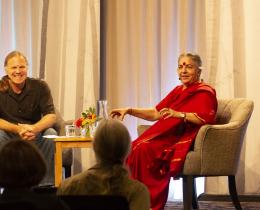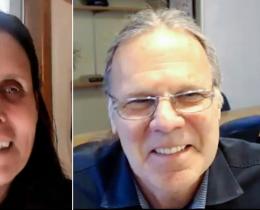One of the biggest reasons I got into seed saving and started the Hudson Valley Seed Library was because of the massive cultural and agricultural erosion caused by the unprecedented consolidation in the seed industry over the past 80 years. There's a direct relationship between consolidation and loss of genetic diversity. There are also equally alarming connections between consolidation and toxic agrichemicals, environmental degradation, soil loss, and food justice.
There's a graphic that I use in my lectures that was created by Phil Howard, Associate Professor in the Department of Community Sustainability at the University of Michigan. It's a bold visual representation of consolidation in the seed industry. It shows how only six companies control more than half of the world's seeds. Monsanto is the largest owner of global seed resources with Bayer, Dow, DuPont, Syngenta, and BASF following behind. I never would have imagined that this map would need to be drastically redrawn—that number could soon shrink to three.
Here's what it looked like as of 2013.
What Agricultural Mergers Look Like in 2016
Phil has got his work cut out for him with three massive mergers about to take place: Bayer Pharmaceutical is buying Monsanto, Dow and DuPont are merging, and ChemChina is buying Syngenta. None of these multinational corporations are farm-focused, food-focused, or interested in nutrition, food justice, natural ecosystem protection, or the needs of regional and organic farmers. Their primary interests are in producing agricultural chemicals including herbicides, pesticides, and chemical fertilizers. This consolidation is the ultimate monopolizing.
What we stand to lose in this new tidal wave of consolidation is food security based on regional food systems, independent seed sources, and genetic, as well as cultural diversity. What is threatened with these mergers is the future of agriculture.
Why Save Seeds
Becoming a seed steward has never been more important. Whether you farm or have never grown a plant in your life, you can be a seed steward. We are all here because our ancestors learned how to save seeds. More than that, we are here, living in highly cooperative communities, because previous generations did more than save seeds, they shared them. They shared seeds freely, like water. They saw the abundance and generosity of plants gone to seed and passed that generosity on to many hands. Those seeds are still with us today, feeding us, nurturing our children, showing us the power of community. And they need our care more than ever.
The Hudson Valley Seed Library is part of a growing community of seed stewardship-focused organizations including Organic Seed Alliance and Vandana Shiva's Seed Freedom network. But we need to do more, and we need your help. Our organization is currently working on dedicating more energy to address the newest threats to seeds including the monopolization of the seed industry, loss of genetic diversity, and minimal seed soveriengty. If you would like to become involved and learn how you can be a seed steward, even without a garden, please sign up for our Seed Freedom email list. This group will be the first to hear about important actions and how to support our efforts.


